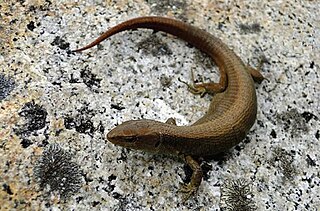
The International Union for Conservation of Nature (IUCN) Red List of Threatened Species, founded in 1964, is the world's most comprehensive inventory of the global conservation status of biological species. It uses a set of precise criteria to evaluate the extinction risk of thousands of species and subspecies. These criteria are relevant to all species and all regions of the world. With its strong scientific base, the IUCN Red List is recognized as the most authoritative guide to the status of biological diversity. A series of Regional Red Lists are produced by countries or organizations, which assess the risk of extinction to species within a political management unit.

Gymnophthalmidae is a family of lizards with at least 250 species, sometimes known commonly as spectacled lizards or microteiids. They are called "spectacled" because of their transparent lower eyelids, which allow them to still see with closed eyes. As in most lizards, except geckos, these eyelids are movable. The Alopoglossidae have been recently moved from this family.

Euspondylus is a genus of lizards in the family Gymnophthalmidae.

A genet is a member of the genus Genetta, which consists of 14 to 17 species of small African carnivorans. The common genet is the only genet present in Europe and occurs in the Iberian Peninsula, Italy and France.

A least-concern species is a species that has been categorized by the International Union for Conservation of Nature (IUCN) as evaluated as not being a focus of species conservation because the specific species is still plentiful in the wild. They do not qualify as threatened, near threatened, or conservation dependent.

A species that is extinct in the wild (EW) is one that has been categorized by the International Union for Conservation of Nature as known only by living members kept in captivity or as a naturalized population outside its historic range due to massive habitat loss.

Tegu is a common name of a number of species of lizards that belong to the families Teiidae and Gymnophthalmidae. Tegus are native to Central and South America. They occupy a variety of habitats and are known for their large size and predatory habits.
Cercosaura phelpsorum is a species of lizard in the family Gymnophthalmidae. The species is endemic to Venezuela.
Euspondylus acutirostris, the sharp-snouted sun tegus, is a species of lizard in the family Gymnophthalmidae. It is endemic to Venezuela.
Euspondylus caideni is a species of lizard in the family Gymnophthalmidae. It is endemic to Peru.
Euspondylus guentheri, Günther's sun tegus, is a species of lizard in the family Gymnophthalmidae. It is endemic to Ecuador.
Wilsonosaura josyi is a species of lizard in the family Gymnophthalmidae. It is endemic to Peru. It is monotypic in the genus Wilsonosaura.
Euspondylus maculatus, the spotted sun tegus, is a species of lizard in the family Gymnophthalmidae. It is found in Peru and Ecuador.
Euspondylus monsfumus is a species of lizard in the family Gymnophthalmidae. It is endemic to Venezuela.
Euspondylus paxcorpus is a species of lizard in the family Gymnophthalmidae. It is endemic to Peru.
Euspondylus simonsii, known commonly as Simons's sun tegu, is a species of lizard in the family Gymnophthalmidae. The species is endemic to Peru.

Proctoporus oreades is a species of lizard in the family Gymnophthalmidae. It is endemic to Peru.
Proctoporus rahmi, Rahm's sun tegu, is a species of lizard in the family Gymnophthalmidae.It is endemic to Peru.

Proctoporus spinalis, Boulenger's sun tegus, is a species of lizard in the family Gymnophthalmidae. It is endemic to Peru.








